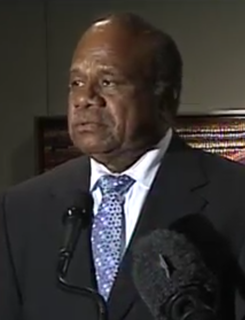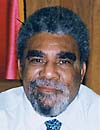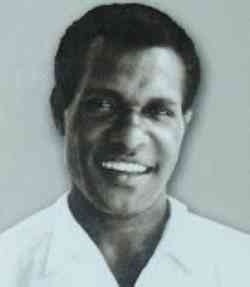
Sir Rabbie Langanai Namaliu is a Papua New Guinea politician. He served as the fourth Prime Minister of Papua New Guinea. from 4 July 1988 to 17 July 1992 as leader of the Pangu Party.
The People's Democratic Movement is a political party in Papua New Guinea.

Paias Wingti is a Papua New Guinean politician. He served as the third Prime Minister of Papua New Guinea between 1985 and 1988, and again from 1992 to 1994.
The United Party is a political party in Papua New Guinea. As of May 2019, it has one seat in the National Parliament and is led by Minister for Foreign Affairs, Rimbink Pato.
The People's Labour Party is a political party in Papua New Guinea.

The People's National Congress is a political party in Papua New Guinea. Its former leader Bill Skate served as Prime Minister from 1997 to 1999 and as speaker of Parliament from 2002 to 2004. Skate died in 2006 and the party is now led by Peter O'Neill. PNC originated from the National Capital District where former leader was the Governor of NCD and the Parliamentary Member. The party had 22 members in the 111-seat National Parliament of Papua New Guinea as of September 2019.

Sir Mekere Morauta was a Papua New Guinean politician and economist who served as the 7th Prime Minister of Papua New Guinea from 1999 to 2002. Inheriting a depressed economy and a fractious legislature, he embarked on fundamental reforms of the country's economy and political system.

Sir Michael Thomas Somare was a Papua New Guinean politician. Widely called the "father of the nation", he was the first Prime Minister after independence. At the time of his death, Somare was also the longest-serving prime minister, having been in office for 17 years over three separate terms: from 1975 to 1980; from 1982 to 1985; and from 2002 to 2011. His political career spanned from 1968 until his retirement in 2017. Besides serving as PM, he was minister of foreign affairs, leader of the opposition and governor of East Sepik Province.
The National Alliance Party has operated as a political party in Papua New Guinea since 1995. As of May 2019, the party had 11 members in the 111-seat National Parliament of Papua New Guinea, and was part of the Alliance Accord for Change, opposition to the O'Neill led government for Papua New Guinea's 10th Parliament.
Francis Marus is a Papua New Guinean politician. He has been a member of the National Parliament of Papua New Guinea since July 2007, representing the electorate of Talasea Open. He was Minister for Higher Education, Research, Science and Technology in the government of Peter O'Neill from July 2016. He was previously the Deputy Speaker of the National Parliament from 2007 to 2012. He has variously represented the Pangu Party (2007–2012), the Papua New Guinea Party (2012–2013), the United Resources Party (2013–2014) and the People's National Congress (2014–present).
The United Resources Party is a political party in Papua New Guinea.
The New Generation Party is a political party in Papua New Guinea.
The Melanesian Liberal Party is a political party in Papua New Guinea.

General elections were held in Papua New Guinea between 18 June and 9 July 1977, the first since independence from Australia in 1975. The Pangu Party led by Prime Minister Michael Somare emerged as the largest in the National Parliament. Somare subsequently formed a coalition government with the People's Progress Party (PPP) and several independent MPs. Voter turnout was 60.3%.

General elections were held in Papua New Guinea between 13 June and 4 July 1987. The Pangu Party emerged as the largest party, winning 26 of the 109 seats. Voter turnout was 73.5%.

Samuel Tei Abal is a Papua New Guinean politician. Abal, who previously served as Foreign Minister from August 2007 to December 2010, became the Deputy Prime Minister of the country in a cabinet reshuffle by Michael Somare on 7 December 2010. He further became acting Prime Minister of Papua New Guinea on 13 December 2010, when Prime Minister Somare stepped down from office to face a tribunal regarding allegations of financial mismanagement. His tenure as acting Prime Minister ended on 2 August 2011, when Peter O'Neill won a parliamentary vote to be appointed as Prime Minister.

Sam Basil is a Papua New Guinean politician. He has been a member of the National Parliament of Papua New Guinea since 2007, representing the electorate of Bulolo Open. From 8 June 2019, to August 2019 Basil served as the Treasurer of Papua New Guinea.

General elections were held in the Territory of Papua and New Guinea between 19 February and 11 March 1972. They saw the election of the country's first female MP, Josephine Abaijah.

Sir Anthony Siaguru was a Papua New Guinean civil servant, lawyer, international diplomat, politician, sportsman and anti-corruption campaigner.

Sir Ebia Olewale (1940–2009) was a politician in Papua New Guinea (PNG). He was elected as a member of the House of Assembly of Papua and New Guinea in 1968 and went on to hold several ministerial positions during the period of self-governance and after PNG's independence in 1975, including that of deputy prime minister. He was knighted in 1983 and served as chancellor of the University of Goroka from 2000 to 2006. From 2002 until his death, he was a director of the Papua New Guinea Sustainable Development Program.









